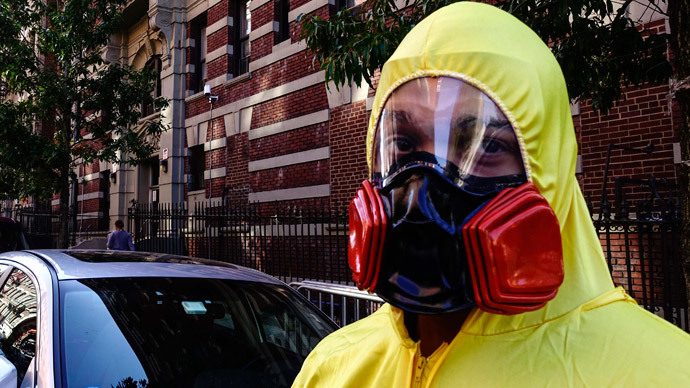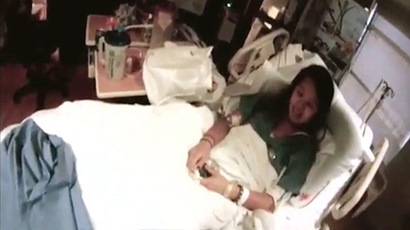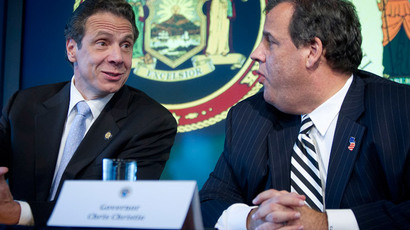'Like a criminal': US nurse quarantined upon return from Africa blasts 'disorganization'

The US nurse who came home from Ebola-affected West Africa on Friday was quarantined at a New Jersey hospital. The first person to be isolated for 21 days under new rules, she described her treatment a "frenzy of disorganization."
Having returned to her homeland from Sierra Leone, Kaci Hickox described her experience, starting with a six-hour isolation at the airport, in a first-person account, published on Saturday.
Healthy but quarantined #Ebola nurse Kaci Hickox tells @dallasnews scared by US frenzy of fear http://t.co/wEZdfjNOUjpic.twitter.com/evycSuVArm
— Jon Williams (@WilliamsJon) October 25, 2014
“Tired, hungry and confused,” she was isolated, with people asking her questions “one after another.”
“No one seemed to be in charge. No one would tell me what was going on or what would happen to me."
After several hours her temperature was tested with a forehead scanner, which revealed “fever” that Hickox said was only a result of flushing cheeks after the airport ordeal. Hickox, a graduate of two US universities explained that an oral thermometer would be more accurate, but she was taken to the hospital instead where she will be staying for 21 days.
“I am scared about how healthcare workers will be treated at airports when they declare that they have been fighting Ebola in West Africa,” the nurse, who had been working with NGO Doctors Without Borders (MSF), wrote in her essay, questioning “Will they be made to feel like criminals and prisoners?”
New Jersey dept of health will not explain why my friend, an #Ebola#nurse, is being held at Newark airport. This is no way to treat #nurses
— Dr. Seema Yasmin (@DoctorYasmin) October 24, 2014
Hickox wrote she was placed in a tent that “sat outside of the building.” The oral thermometer showed no fever and her preliminary tests for Ebola came back negative.
The nurse’s mother and DWB told the Wall Street Journal that Hickox was being held in an unheated tent with a portable toilet, but no shower.
“The location is an extended care facility inside a building that is part of the hospital,” Dawn Thomas, spokeswoman for the New Jersey Department of Health Thomas said in an email, as cited by Reuters. “We understand that this is an inconvenience but our primary concern is the health of the patient.”
On Friday, the governors of two US states – New York and New Jersey – imposed a mandatory quarantine on travelers from Liberia, Guinea and Sierra Leone for the duration of the three-week incubation period of the deadly virus. Later that day, they were joined by the state of Illinois, where officials have let the quarantine on travelers who had contacted with Ebola patients to take place at home.
A voluntary Ebola quarantine is not enough. This is too serious a public health situation. pic.twitter.com/SP1q3PnOrY
— Andrew Cuomo (@NYGovCuomo) October 24, 2014
New Jersey Governor Chris Christie commented on the nurse’s complaints on Saturday.
“So I’m sorry if in any way she was inconvenienced, but inconvenience that could occur from having folks that are symptomatic and ill out amongst the public is a much, much greater concern of mine," he said.
According to AP, health officials in all three states didn’t answer the news agency’s inquiries on the quarantine policies. The lack of details of the quarantine measures that exceed current federal guidelines also gives ground to criticism for healthcare experts and human rights watchdog organizations.
DWB executive director Sophie Delaunay said in a statement, "We are attempting to clarify the details of the protocols with each state's Departments of Health to gain a full understanding of their requirements and implications."
"Coercive measures like mandatory quarantine of people exhibiting no symptoms of Ebola and when not medically necessary raise serious constitutional concerns about the state abusing its powers," an American Civil Liberties Union official in New Jersey, Udi Ofer, said, AP reports.
According to the World Health Organization (WHO), over 10,000 people are infected with Ebola, and almost half of them have already died in the worst-ever outbreak of the virus.














